 21
21
Considered
 119
119
of Research
 55
55
Examined
 15
15
Interviewed
Many athletes are focusing on probiotics, but in my professional opinion, the importance of prebiotics when it comes to the growth of beneficial gut microbiome shouldn’t be underestimated.
The problem is that there are many prebiotic supplement choices, but not many of them have the quality to make any difference.
Basically, you could be wasting a ton of money.
That’s why we teamed up with a nutritionist and dedicated extensive weeks to thorough research. Our goal was to identify the best prebiotics that we would recommend to clients and readers.
The Best Prebiotic Supplements
- Best Overall Prebiotic Supplement: 1MD PrebioMD
- Cheapest Prebiotic Supplement: vH Essentials Probiotics with Prebiotics
- Best Prebiotic Sugar-Free Gummies: BeLive Probiotic
- Best Prebiotic Pills for Seniors: Zenwise Health Digestive Enzymes
- Best Vegan Prebiotic Supplement: Garden of Life
- Best Prebiotic Capsules for Women: vH Essentials Probiotics with Prebiotics
- Best Prebiotic Powder With Fibers: Hyperbiotics Organic Prebiotic Supplement
- Best Prebiotic Complex for Immune System: Zenwise Health Digestive Enzymes
- Best Prebiotic Supplement for Weight Loss: Performance Lab Prebiotic
Our Best Prebiotic Supplements (June 2025)
1 - 1MD PrebioMD Prebiotic Supplement (Best Overall)
- Price per serving : $1.49
- Key ingredients : PreticX, Larch Arabinogalactan
- Form : Capsule
- Third-party tested : Yes
Pros and Cons
Pros
- Seems to work within weeks to rebalance the bacteria in your gut
- One of the best prebiotic for not causing bloating
- Great bulk discounts available
- No known side effects
Cons
- The exact formula and amounts are proprietary information
Who is it for?
Who is it for?
- Those needing comprehensive gut health
- Seeking an effective prebiotic and probiotic combo
Who is it not for?
- Price-sensitive individuals
Final Verdict
Premium ingredients and strong combination. Expensive but effective.
1MD has created one of our favorite probiotic supplements, and this prebiotic could be the right complement to that.
There are also positive comments about the overall health benefits with practically no side effects.
If you’re already taking the 1MD probiotics, then you could end up saving a lot through the bulk offers that are regularly available.
During the testing phase of this supplement, I experienced notable improvement in my digestive well-being, as evidenced by a reduction in bloating discomfort.
The only thing we found a bit annoying is that the label shows a proprietary blend, so you don’t get the exact amounts of each ingredient.
2 - Performance Lab Prebiotic Supplement (Best for Weight Loss)
- Price per serving : $0.85
- Key ingredients : Inulin-FOS, Chicory Root Extract
- Form : Capsule
- Third-party tested : Yes
Pros and Cons
Pros
- Seems to work well to settle common stomach issues
- May suppress appetite to help with dieting
- Gluten, soy, and GMO-free for added peace of mind
Cons
- It’s more expensive than the other Prebiotic Supplements
Who is it for?
Who is it for?
- Those looking to enhance athletic performance
- Seeking immune support
Who is it not for?
- Price-sensitive individuals
Final Verdict
Focuses on performance and immune support. Worth the investment but costly.
Clients who tried Performance lab prebiotic say it seems to provide the right combination of benefits for gut bacteria, immune function, and energy levels.
What I also noticed while testing this supplement was that it may increase your fiber intake enough to make you feel full for longer. That could help with better nutrient absorption and bridge longer fasting periods.
Now, I will say that this isn’t the cheapest option, but if you go for one of the bulk order offers, then you could be making Performance Lab prebiotic more affordable.
3 - vH essentials Probiotics with Prebiotics (Cheapest & Best for Women)
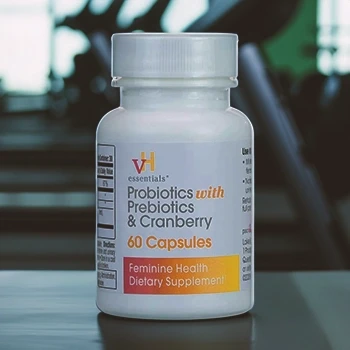
- Price per serving : $0.33
- Key ingredients : Lactobacillus acidophilus, Bifidobacterium
- Form : Capsule
- Third-party tested : No
Pros and Cons
Pros
- Specifically formulated for female requirements
- Contains some added vitamin C for immune system support
- Added cranberry extract may help with urinary tract issues
Cons
- Might not be strong enough for severe digestive health issues
Who is it for?
Who is it for?
- Women seeking health support
- Those needing comprehensive prebiotics
Who is it not for?
- Individuals sensitive to certain ingredients
Final Verdict
Designed for women, high-quality ingredients. Might not suit those with sensitivities.
I appreciated the dual action of this prebiotic and probiotic combo, which seemed to streamline my supplement routine while supporting my gut health.
The formula has been designed with both prebiotics and probiotics specifically for women, and many of our female athletes seem to have successfully used this one for their weight loss goals.
According to a PubMed study, you may also notice a positive boost to your immune function from some added vitamin C [1]. And women who may suffer from urinary tract infections may get some benefits from the added cranberry extract [2].
For females that have weak immune system, we recommend checking out our list of the top woman's multivitamin products.
4 - Zenwise Health Digestive Enzymes (Best for Seniors & Immune System)
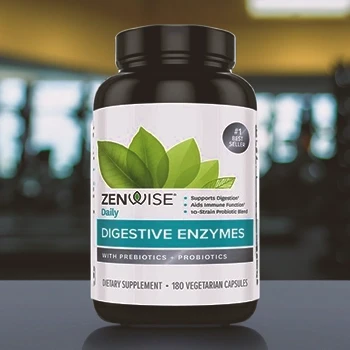
- Price per serving : $0.50
- Key ingredients : Amylase, Protease, Lipase
- Form : Capsule
- Third-party tested : No
Pros and Cons
Pros
- Claims to combine digestive enzymes and prebiotics for an efficient digestive tract
- Seems to work well for your immune system
- Positive comments from elderly people with digestive tract issues
Cons
- Some reports of minor bloating when you start taking Inulin FOS
Who is it for?
Who is it for?
- Those seeking natural ingredients
- Those needing digestive relief
Who is it not for?
- Those expecting quick results
Final Verdict
Natural ingredients, gentle and effective. Requires consistent use for results.
Zenwise has created one of the more unique prebiotic supplements by combining a prebiotic fiber and digestive enzyme blend.
According to a study we found in the National Library of Medicine, the goal of this combination is to help with feeding your gut bacteria and breaking down macronutrients more easily [3].
This might also help with weight loss goals through a more efficient digestive tract and overall gut health [4].
During my evaluation of this supplement, I noticed enhanced capability to alleviate stomach discomfort, facilitate efficient digestion, and regulate my bowel movements.
I also observed a boost in my energy levels, as I didn't experience the post-meal fatigue that often accompanies extra carbohydrates and sugars.
5 - Dr. Tobias Prebiotic Supplement
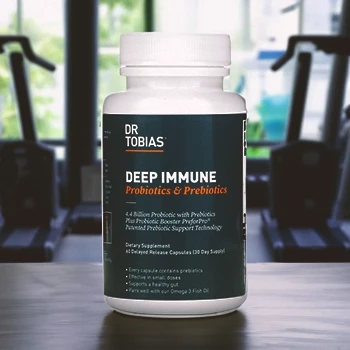
- Price per serving : $0.42
- Key ingredients : PreforPro, Xylooligosaccharides
- Form : Capsule
- Third-party tested : Yes
Pros and Cons
Pros
- Has positive reviews about helping with diarrhea
- Claims to only feed the good bacteria in your gut
- Capsules seem to be small and easy to swallow
Cons
- It is not meant for more severe digestive health issues so you might need to use stronger prebiotic supplements
Who is it for?
Who is it for?
- Those needing gut health support
- Seeking a cost-effective supplement
Who is it not for?
- Individuals sensitive to certain ingredients
Final Verdict
Cost-effective and effective. Simple ingredients, suitable for many.
The blend of prebiotics in this supplement claims to have been medically developed to work in two ways.
Not only might it help to feed the good bacteria in the gut, but it may also starve the bad bacteria to get to a better and more balanced gut microbiome and overall gut health.
This may explain why it has helped me deal with stomach issues like diarrhea.
We also found that the capsule size was small enough to make it much easier to swallow them.
Our dietitian only pointed out that the Dr. Tobias Prebiotic Supplement might not be the best if you're dealing with more severe health conditions like inflammatory bowel disease or irritable bowel syndrome.
6 - BeLive Probiotic Sugar-Free Gummies (Best Sugar-Free)
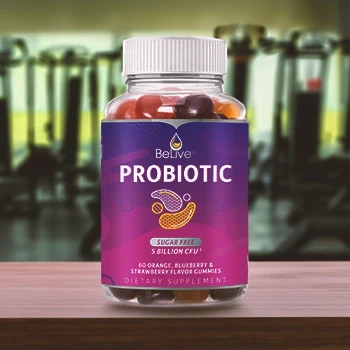
- Price per serving : $0.67
- Key ingredients : Bacillus Coagulans, Chicory Root
- Form : Gummy
- Third-party tested : No
Pros and Cons
Pros
- Suitable for kids and adults with convenient gummies
- Positive comments that it may help with hunger cravings
- Free from the most common allergens
Cons
- The gummies tend to stick together
Who is it for?
Who is it for?
- Those preferring a gummy format
- Seeking sugar-free options
Who is it not for?
- Those avoiding gummy supplements
Final Verdict
Convenient and tasty. Sugar-free, but not for everyone.
BeLive's prebiotic gummies were a hit with my client's kids who said the convenience and taste made it easier for him to stay consistent with the kids' prebiotic intake.
It seems to have decent fiber content, as it has helped me feel full for longer in between meals.
That could make it suitable for getting to weight loss goals faster.
And if you suffer from common food allergies like gluten or soy, then this might also be a suitable option.
I would just recommend storing the gummies in a cool and dark place, as they tend to get stuck together if they get too warm.
7 - BioSchwartz Prebiotics for Advanced Gut Health
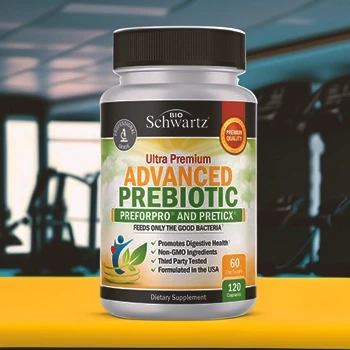
- Price per serving : $0.55
- Key ingredients : Jerusalem Artichoke, Chicory Root
- Form : Capsule
- Third-party tested : Yes
Pros and Cons
Pros
- Claims to provide relief for digestive health issues within hours
- The balanced formula should work well for men and women
- Positive comments about immune system boosts
Cons
- Might not be strong enough for severe disruptions of the digestive system
Who is it for?
Who is it for?
- Those needing advanced gut health support
- Looking for a trusted brand
Who is it not for?
- Price-sensitive individuals
Final Verdict
Trusted brand, effective formula. Higher price point.
This BioSchwartz prebiotics supplement helps with issues like diarrhea and constipation, which are often down to gut bacteria imbalances.
The formula is also not too strong to make it less suitable for women who may be a bit sensitive to sudden changes in their levels of beneficial bacteria in the gut.
We also noted that quite a few of our clients mentioned that they noticed an overall health boost from better immune responses.
Through testing and evaluation, it becomes clear that this product lives up to the claims put forth by the brand's supplement regarding immediate digestive benefits. I have personally observed a reduction in excess gas and the alleviation of constipation concerns.
8 - Hyperbiotics Organic Prebiotic Supplement (Best Powder With Fibers)
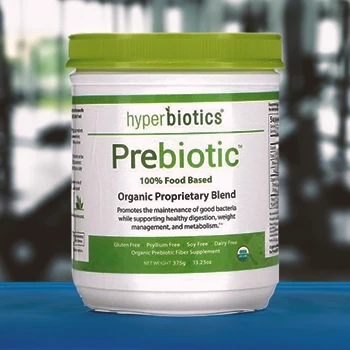
- Price per serving : $0.44
- Key ingredients : Fructooligosaccharides, Inulin
- Form : Powder
- Third-party tested : Yes
Pros and Cons
Pros
- Seems to contain a good dosage of soluble fibers
- Positive reviews about it helping bowel movements if you’re constipated
- Comes in a powder form that may be mixed with food and smoothies
Cons
- Some initial gas seems to be common
Who is it for?
Who is it for?
- Those seeking organic options
- Those with sensitive stomachs
Who is it not for?
- Those expecting quick results
Final Verdict
Organic and gentle. Requires consistent use for best results.
As someone who prioritizes organic ingredients, I was drawn to this prebiotic blend. The inclusion of Jerusalem artichoke and green banana flour resonated well with my preference for natural sources.
This fiber may also be helpful for anyone who might regularly have problems with constipation that could become quite uncomfortable.
One thing we did notice is that some people reported some initial gas after taking this supplement. But that would generally be a positive symptom that it’s working.
9 - Prebiotin Prebiotic Supplement

- Price per serving : $0.63
- Key ingredients : Inulin, Oligofructose-Enriched Inulin
- Form : Powder
- Third-party tested : Yes
Pros and Cons
Pros
- People like that it’s easy to gradually increase the dosage
- Based on chicory root fiber which should promote healthy bacteria growth
- Free from the most common allergens to avoid reactions
Cons
- Full dosage would require four tablets per day
Who is it for?
Who is it for?
- Those needing digestive support
- Seeking a versatile prebiotic
Who is it not for?
- Individuals sensitive to fiber
Final Verdict
Versatile and effective. High fiber content may not suit everyone.
Some people tend to react sensitively to prebiotic supplements, which might mean that they need to be able to take smaller doses.
That’s one of the advantages of Prebiotin, which allowed me to easily adjust the dose up and down due to small tablets.
We also think that by choosing chicory root as the main source of fiber, the product should make a great fiber supplement to keep you more regular [5].
Just keep in mind that to get the full dosage, you would need to take four tablets throughout the day, but it shouldn’t take too long to get used to such a supplement routine.
10 - Garden of Life Dr. Formulated Organic Prebiotic Superfood (Best for Vegans)

- Price per serving : $0.83
- Key ingredients : Acacia Fiber, Potato Starch
- Form : Powder
- Third-party tested : Yes
Pros and Cons
Pros
- Contains a good dose of soluble fiber
- Seems to work well to rebalance the gut microbiome
- It’s a vegan certified option
Cons
- The flavors don’t seem to be that great
Who is it for?
Who is it for?
- Those seeking whole-food supplements
- Those needing digestive balance
Who is it not for?
- Those avoiding certain allergens
Final Verdict
Whole-food based, well-rounded. May contain allergens.
Our final of all prebiotic supplements recommendation comes from Garden of Life, which is another one that claims to have been formulated by doctors who work as digestive system specialists.
Our tests found it provides quite a strong dose of fiber from acacia fruit, which tends to be one of the more commonly recommended foods for improved digestion.
The only thing I would say is that we weren’t overly impressed with the flavors, but you might be OK with that to get a certified vegan source of dietary fiber.
For other vegan vitamin supplement recommendations, check out the best vegan-friendly multivitamins.
How We Tested Prebiotic Supplements
Here's how we chose the best prebiotic supplements.
Ingredient Analysis
Our team of nutrition experts examines the type of prebiotic fibers used, such as inulin, fructooligosaccharides (FOS), galactooligosaccharides (GOS), and others. We verify that the supplements contain effective dosages based on the latest research and ensure there are no unnecessary fillers or artificial additives.
Brand Reputation
We assess the reputation of the brand producing the supplement. This involves researching their history, manufacturing practices, and commitment to quality. Brands that engage in third-party testing and have certifications such as Non-GMO, Gluten-Free, or Organic score higher in our evaluation.
Consumer Experience
We gather consumer reviews and testimonials to understand the supplement's impact on digestive health, any side effects experienced, and overall satisfaction with the product. We also conduct a survey among our community members who have tried the supplements to gather more detailed insights.
Efficacy Trials
Our team conducts a controlled trial with volunteers from our community to monitor the effects of the supplements over a set period. Participants report on various health markers, including digestive comfort, bowel movement regularity, and any changes in symptoms like bloating or gas.
Cost-Effectiveness
We analyze the cost per serving of the supplements to determine their value for money. A higher price tag doesn't always mean a better product, so we balance cost with the quality and concentration of active prebiotic compounds.
Buyer's Guide
To pick the best prebiotic supplement, consider factors such as the types of prebiotics added, the dosage amount, the quality, and the brand's reputation.
1 - Types Of Prebiotics
Unlike probiotic supplements, there are not hundreds of different types of prebiotics. You probably will notice that different products list specific marketing names for their fiber blends.
But in most cases, they use just a handful of different types of fiber sources.
The reason is that different bacteria species aren't actually all that picky when it comes to fiber, so a few types might actually be more than enough to rebalance your gut flora and possibly stabilize your blood sugar [6].
2 - Dosage Amount
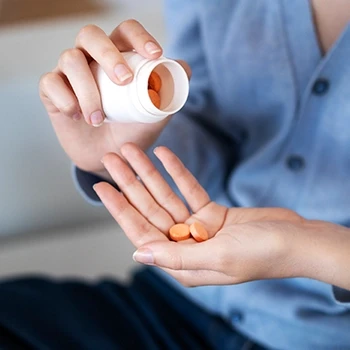
We came across many prebiotic supplements that use great sources like dandelion greens, but just don’t provide enough of them.
Now, you could just take more of it, but that would end up costing you a lot more.
It’s an unfortunate reality that some companies take advantage of using proven ingredients in too small amounts.
When it comes to fiber, you’d want to see at least 2 grams in each capsule, otherwise, it probably won’t make too much of a difference.
3 - Quality
You’ll see a value of colony forming units on probiotics, but prebiotics don’t have such a measure. Instead, they will focus more on the strains of bacteria they feed.
The higher the quality, the more effective it should be at feeding your gut microbiota and protecting your gut lining as well.
One ingredient that is commonly used where quality apparently plays a critical role is burdock root.
In many of the cheaper supplements, you might find that they just don’t cause the same benefits, which is often down to low-quality sources.
4 - Different Prebiotic Benefits

The different sources that are commonly used may also bring about quite different results.
One of the main functions is to provide a source of nutrients to feed some of the important good bacteria in your gut.
But fiber also has some other benefits that shouldn’t be ignored, such as:
- Weight management: By promoting feelings of fullness and reducing the glycemic impact of foods, prebiotics like inulin can help curb appetite and prevent overeating [7]. Furthermore, they assist in regulating blood sugar levels, which is crucial for maintaining a healthy weight [8].
- Skin health: Glucomannan, a natural prebiotic derived from the konjac root, is a soluble fiber that aids hydration and may even support the body's natural healing processes, which can lead to clearer, more radiant skin.
- Liver health: Fenugreek has been shown to have a positive impact on liver health. It contains a wealth of antioxidants that help in reducing oxidative stress, a key factor in liver disease. Additionally, fenugreek can aid in regulating blood glucose levels, which is beneficial for the liver's metabolic functions.
Related Posts:
How Can I Increase Prebiotics In My Diet?
To increase prebiotics in your diet, consider adding foods like green bananas, spinach, Jerusalem artichoke, garlic, dandelion, and konjac root.
During our conversation with a dietitian, we also got onto some interesting topics about getting natural prebiotic food products into your diet.
Yes, there are some foods that would do the same as supplements. But as you’ll find out, a lot of them are not the easiest to buy in stores or add to your meal recipes.
So, what are prebiotic foods?
Here are some ideas.
1 - Green Bananas
Many athletes turn to bananas as a source of slow-release energy and potassium to help with hydration.
Usually, that means nice yellow ripe bananas. Not the green ones that are tough to peel.
But if you eat some unripe green bananas, then you could also be getting some fructooligosaccharides, which is a good prebiotic fiber [9].
2 - Spinach
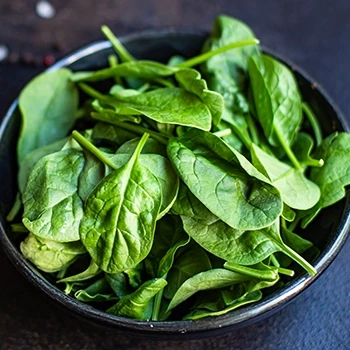
The interesting micronutrient in spinach is a long-chain sugar molecule called sulfoquinovose [10].
Research has shown that it may feed bacteria in your lower intestine [11].
3 - Jerusalem Artichoke
These are neither from Israel nor are they even related to the traditional artichoke.
But this inulin-rich food could be one of the best natural ways to get fiber into your system [12].
We’ve just found it quite difficult to buy in most stores, so you may need to shop around a bit.
4 - Garlic

Garlic is rich in inulin, which is a great fiber provider.
The only problem is that garlic has a strong flavor, and you’d need quite a bit of it added to your food.
So much that you might not be the most popular person at the office.
5 - Dandelion
Yup, it’s those weeds you probably try to get rid of in the garden. But the leaves on these weeds may be full of fiber, antioxidants, minerals, and vitamins [13].
“Some researchers have proposed that dandelion could help people achieve their loss of weight goals. This is based on the plant’s ability to improve carbohydrate metabolism and reduce fat absorption.”
- Jenna Fletcher, health and wellness writer.
6 - Konjac Root
FAQs

Are Prebiotic Supplements Effective?
Yes, prebiotic supplements are effective. When you introduce new bacteria to your body, it’s vital to feed those bacteria for them to replicate and form large enough colonies.
Do Prebiotics Help You Lose Weight?
Yes, prebiotics may help you lose weight. Your gut is the part of your body most tied to how you process and metabolize nutrients. As some prebiotics come in the form of fiber, they may also help to make you feel full for longer in between meals.
Is Apple Cider Vinegar a Prebiotic?
No, apple cider vinegar isn’t a prebiotic. This misconception comes from the fact that apples contain a prebiotic called pectin, but the fermentation process practically removes all of the pectins. That doesn’t mean apple cider vinegar isn’t beneficial, just not as a prebiotic.
Our Verdict on the Best Prebiotics
After weeks of meticulous testing and research, my top recommendation for a prebiotic supplement is 1MD PrebioMD.
This supplement stood out not only for its efficacy, which I noticed within weeks, but also because it didn't cause any bloating — a common issue with many prebiotics.
The bulk discounts are a bonus, making it a cost-effective option for long-term use. While the proprietary blend means you can't see the exact amounts of each ingredient, the results spoke for themselves.
It's a product I've come to trust for maintaining my gut health and one that I believe could make a significant difference for others seeking a reliable prebiotic.
Our #1 Recommendation
1MD PrebioMD Prebiotic Supplement (Best Overall)
Rated With Total Shape's Scoring System
- Seems to work within weeks to rebalance the bacteria in your gut
- One of the best prebiotic for not causing bloating
- Great bulk discounts available
- No known side effects
- Get the BEST PRICE until the end of June
- The exact formula and amounts are proprietary information
About The Author
You May Also Like
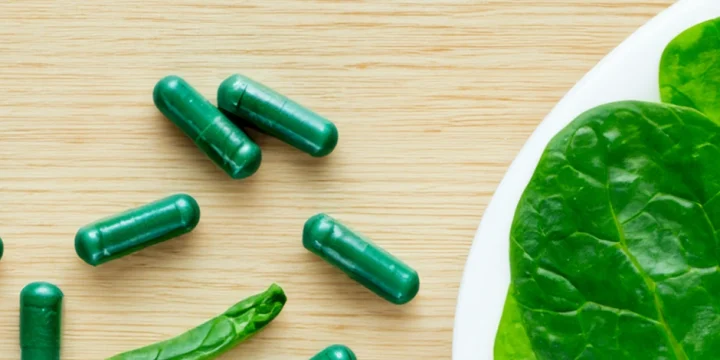
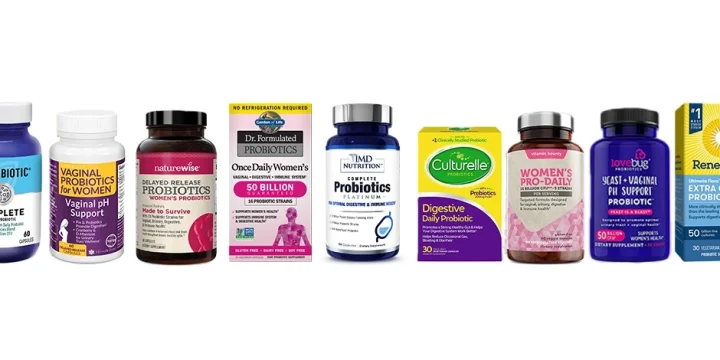

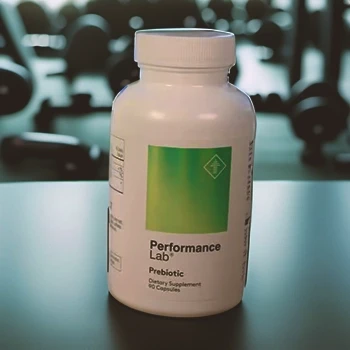




Prebiotics are a vital aspect of my health and fitness routine, ensuring a healthy gut. This review updated article only confirms the importance of adding prebiotic supplements to your diet.